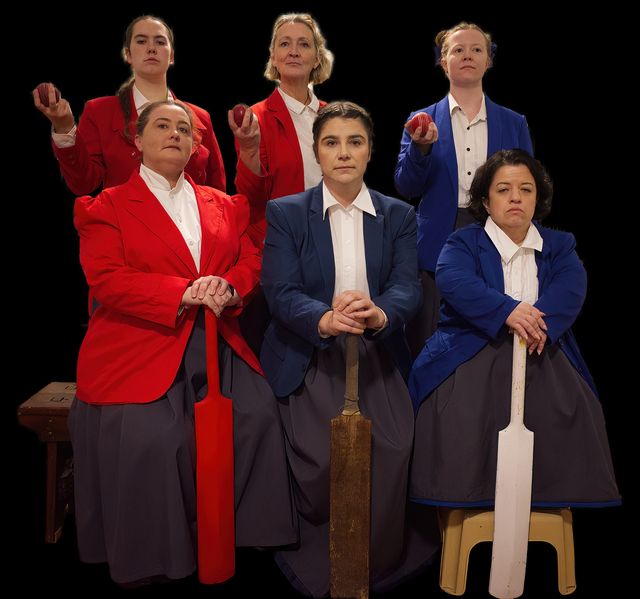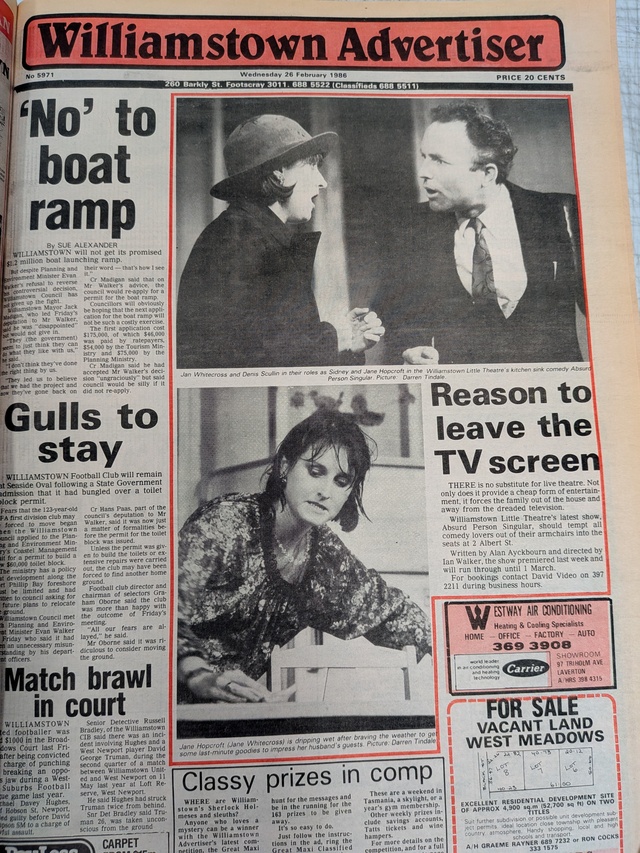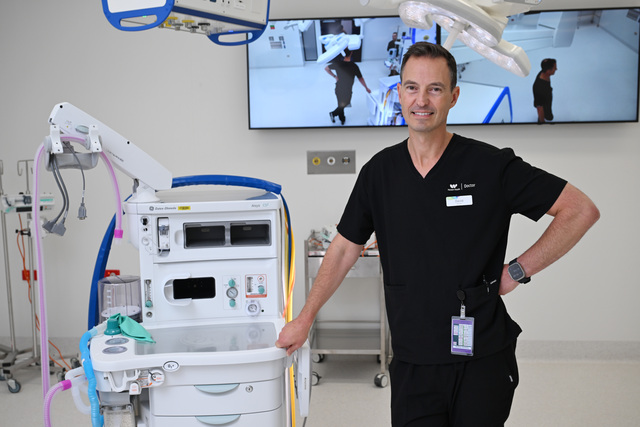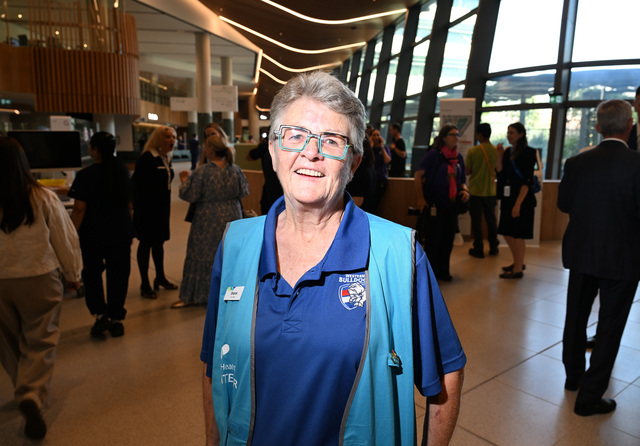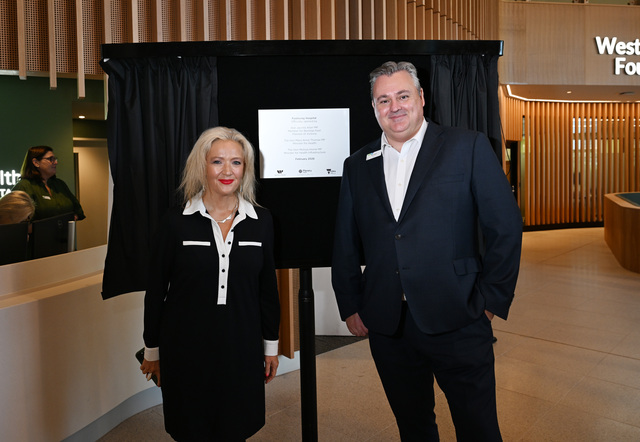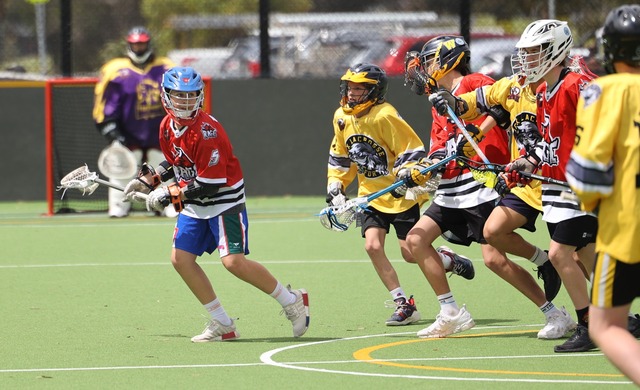Gellibrand candidate Tim Watts, who hopes to retain the safest Federal seat for Labor in Australia, discusses his campaign with Weekly reporter Benjamin Millar.
Q: Let’s start with a quick introduction for those unfamiliar with you – who is Tim Watts?
A: I’ve spent the majority of my career in the private sector. I started off my career as a corporate lawyer in the telecommunications sector. I spent a couple of years doing that before jumping in to work for Stephen Conroy developing the NBN.
I’d been doing multi-billion dollar transactions at Mallesons and when Steve Conroy got the Communications portfolio I jumped across to work with him. I worked on the NBN there for a few years, in the middle of which I went to London for a year to do my Masters at the London School of Economics, came back and did a brief stint with John Brumby then went to Telstra to work as the regulatory affairs manager.
One the personal front I’ve got two small children, a two-year-old daughter and a six-month old son. My wife is a Chinese immigrant, she came to Australia when she was in primary school. We speak two languages at home – Cantonese and English, which has been great on the campaign trail, being able to relate to more than 60 per cent of residents of Gellibrand who have at least one member of their family born overseas. That’s what my family looks like as well, so it makes it easy to relate.
Q. How did you come to be involved in politics?
A. My mum was a union delegate so she always instilled in me the importance of the Labor mission. I joined the Labor party in 2000, so some time ago. In our household there was always conversation about the Labor mission of lifting people up. It was always about expanding opportunities both economically and socially and I think this government has a very good record on that. From my side of the family we’re sixth generation Australian, they’ve been around since the 1850s. On my wife’s side she’s first generation. So I like to say that my kids are both seventh generation and second generation, both old and new Australia, the best of our modern society.
Q. When did you first consider running for Gellibrand?
A: I think Nicola Roxon’s retirement [announcement in February] was a surprise to us all; it was at that moment that I started considering it. I don’t usually comment on internal party matters, but I didn’t know that Nicola was going to resign and when she did that’s when I started thinking about it.
Q. What drew you to federal rather than state or local politics?
A. Federal politics is the big game. It’s where you can have the big impact on people’s lives. You look at the last government, a change like trebling the tax-free threshold is not something you see discussed much at all, but I think it’s one of the great progressive achievements of this government. It’s a reform that means more money in the back pocket of low-income earners every month. If you haven’t lived pay packet to pay packet or month by month you don’t know how important that is, but that’s made a significant change to the lives of tens of thousands of people in Gellibrand.
You can speculate on why the media’s not interested in it, it’s not glamorous, but it’s made a substantial change in people’s lives. As indeed has the government’s superannuation reforms. Moving superannuation from 9 to 12 per cent is going to mean tens of thousands of dollars more at retirement age for people in this electorate. So when you say what attracts you to federal politics, I suppose it’s where you make the macro changes to people’s lives.
Q. If those are the things about which you feel Labor can be proud, where do you see steps such as cuts to single-parent payments, the proposed ‘boot-camp’ for the dole and the long-term lag in Newstart payments behind pensions?
A. There’s no doubt as the fiscal situation tightens, Labor has had to make some very tough choices. But I think if you look at the choices that have been made Labor has prioritised work incentives. Labor has always been the party of work and the party that has put the dignity of work first, so I fully appreciate they are painful cuts. I was raised in a single parent environment. My father was very involved in my childhood, so I can appreciate how difficult that environment is but like I say on the overall level they are changes that prioritise work.
One of my political mentors said Labor’s mission should be winning centuries, it shouldn’t be focussed on winning elections, it should be winning centuries. What he meant by that was Labor’s job is to change the terms of the political debate. We’re a party of government, we’re not a protest party, so our objective needs to be over time winning the public debate, winning the debate with voters on issues. The best example of this is Labor’s introduction of Medicare… Changing the terms of political debate is the real challenge for us.
Q. If it’s Labor’s job to lead the political debate, why were the first two big policy shifts upon Kevin Rudd’s return to the leadership moving from a carbon tax to an ETS, and the PNG solution in asylum seeker policy – the two areas that have been the primary focus for the Opposition’s attack on the government?
A. Moving forward the transition from carbon tax to an emissions trading system was a sensible decision. It maintains pricing carbon, it delivers the right investment signals to industry, saying their will be a carbon price going forward so invest accordingly. I think that makes sense as a way to address what is a global problem.
The asylum seeker issue is very similar to that. It’s an issue that causes a lot of strong emotion on both sides of the issue. I think that’s because it’s complex. It’s complex both from a policy sense and from a moral sense. I make no reflections upon people who come here by boat, large numbers of asylum seekers who come here by boat are genuine refugees, however while they may be very visible, the people who are less visible in this debate are asylum seekers in Kenyan refugee camps, in other refugee camps in other places in Asia.
In Gellibrand there are very large populations of South Sudanese, of Karen refugees. I want an asylum policy that is fair across all asylum seekers. Clearly we can’t take everyone in the world who is seeking asylum. The numbers are just too great for any one country, but within the numbers that we can take, we take people not on the basis of either geographical or financial circumstance, but on some kind of principal. We’ve increased the resettlement quota from under 10,000 under John Howard to now 20,000 with a view to increasing it to 29,000 and that’s something that directly benefits families in this electorate.
I think it’s a complex issue but one we have a strong story to tell on. More broadly, I don’t want the issue of asylum seekers who arrive by boat undermining support in the general community for Australia’s multicultural society. Australia has an exceptional story to tell, it has made multiculturalism work in a way Germany and the US and other European countries haven’t. Out migrant communities in many respects are more successful than established Australians and that’s extraordinary. I wouldn’t want the issue of asylum seekers undermining support for that success.
Q. Voters and your opponents have been raising the fact you are living in Fitzroy rather than in Gellibrand. What do you say to the view you are in less of a position to be on top of local issues?
A. I will be moving to Footscray in the near future, as soon as I can manage the practicalities of the move. I recognise it is a legitimate issue for people and I’m trying to make the move as soon as I can.
Q. Labor has been trying to move away from perceptions seats like this don’t necessarily have local representation, how does this situation change that?
A. I won a ballot of local party members, it’s not anything imposed on anybody. An electorate like Gellibrand has very high expectations of its members. They expect they have a strong Labor voice standing up for their interests, and I fully intend to be that.
Q. What are the main things people have been raising with you as you have been campaigning?
The number one issue by far is jobs. People look at the global economic environment and they feel unsure about their personal economic circumstances, they want a government that puts [the voters’] jobs first. That comes out very clear in areas like Sunshine, Altona, Ardeer. That’s what makes it all the more galling to see that in Altona we’ve got thousands of jobs at the Toyota plant, this government has got a very strong record of co-investment in Toyota and Australian car manufacturers and all of that government commitment is at risk under a Coalition government.
Tony Abbott said the other day that Labor’s auto co-investment policy is a band-aid – if the Liberal candidate for Gellibrand shares that view, he ought to go out to the Altona plant and look the thousands of workers in the eye and tell them that, that the government support that is ensuring their jobs is just a band-aid.
Q. Are you confident there will be an auto industry in Melbourne’s west and in Australia in five, ten and twenty years’ time?
A. [The people of] Australia believe that the Australian auto industry is not just a major part of our economic past but a big part of our economic future. Auto manufacturing is where we do our most cutting edge innovation in manufacturing. It’s entirely IT-driven, it’s cutting-edge stuff and it’s a platform industry for other parts of the economy. It helps us develop heavy mining equipment and develop other manufacturing industries that are growing very strong at the moment. Auto manufacturing has a very strong future in Australia under a Labor government. It has a very big question mark over it under a Coalition government.
Q. You mentioned the Labor party is a governing party, not a party of protest, but if you were to fall into Opposition how could you be an effective representative?
A. Unfortunately Labor members for Gellibrand have been in Opposition in the past, so I’d look to that for a model. I think Nicola Roxon has been a very effective advocate for the area from Opposition, her advocacy around health care services in the west, particularly around the MRI machine, delivered real outcomes to the area from Opposition. That being said I fully expect the Rudd government to be re-elected. It’s got a record that deserves re-election.
Q. Do you believe there could have been a Julia Gillard government after the election?
A. Julia left a very substantial policy legacy, that’s a legacy that we can take to voters. But that’s hypothetical now.
Q. Do you think people are comfortable with how that transition back to Kevin Rudd occurred?
A. Those kinds of issues I don’t hear from voters. All in all there’s been a good reaction to Kevin coming back. I’ve had a lot of people approaching me in the streets or at railway stations come up to me and say Kevin Rudd thumbs up, so there’s a lot of affection out there for him, but again that’s not to denigrate Prime Minister Julia Gillard’s impressive record. People just want to know they have a leader out there in Canberra looking out for them and Kevin Rudd ticks that box.
Q. Given we’ve had these internal wrangles so much in the spotlight, do you think there is fatigue in the electorate before the campaign even begins?
There’s no doubt Labor is strongest when it’s looking outwards. We’ve spent much of the last four years focusing in, but I can definitely say in this election campaign we’re focussed very much on what voters care about – managing the economy in a way that protects jobs, managing the transition of the Australian economy away from the mining boom. As I say, people want to hear about both the government and the Opposition policies to deal with this. There is a sense of change in the electorate, economic change, and people are very interested to hear how that can be managed. I can tell you they don’t want that managed with a carbon copy of European austerity measures, where government services and investment is cut and jobs are thrown on the bonfire of ideological vanities.
Q. With the Chinese appetite for Australian resources dwindling, what can the government do on the economic front?
A. There’s no doubt we need a renewed focus on productivity, Kevin Rudd has made that very clear in the National Productivity Agenda. Productivity is an abstract term, but at the end of the day we have got to work out how to make more with less. Something like the Melbourne Metro that Federal Labor has committed $3 billion for is a major productivity enhancing investment. It cuts down the amount of time that people waste in commuting every day. It’s more of the day they can spend in their workplace and at home with their family, in their private lives. You look at particular issues in the west like untreated diabetes. We can’t address the diabetes crisis we have in society by cutting preventative health. We need to focus on managing the change in the economy, but to do that we need to make sure that we’re making smart investments.
Q. So you see the Melbourne Metro as a priority project ahead of the East-West Link?
Federal Labor has been very clear we take an evidence based approach to infrastructure investment. Labor allocated $3 billion to the project. The state Liberal party hasn’t done it’s homework on the east-west. It was late to submitting any form of material to Infrastructure Australia and what they have submitted, based on what is publicly available, is manifestly inadequate. A road that doesn’t even reach the west – I’m not sure how that is going to help take trucks off streets in the west.



